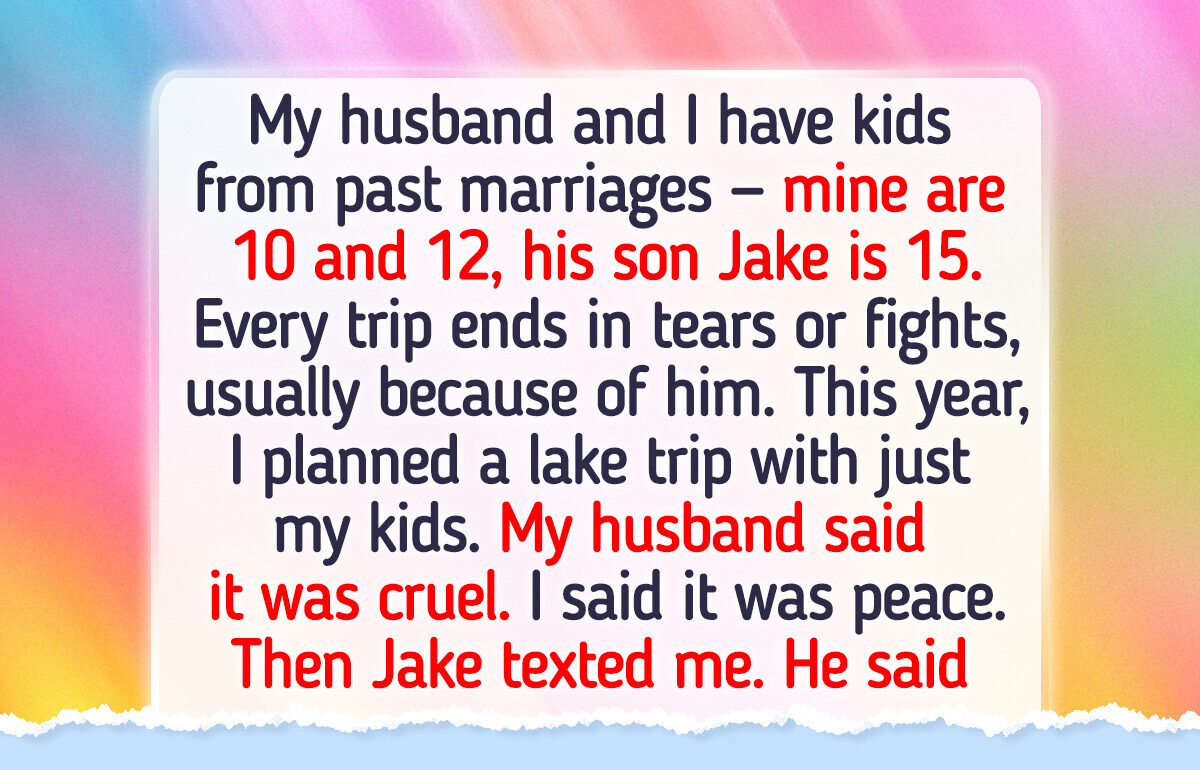Jeez. I get you wanted a drama free vacation but the kid is 15 a conversation should have been had. Ask him why he acts like this and then ask if he will stop. Advise your husband that his son is 15 and if he can't control him why should your kids put up with that. This is a parenting issue. Your husband might want a divorce.
I Told My Stepson He Can’t Join Our Family Vacation—My Kids Deserve a Drama-Free Trip

We got a letter from a reader who reminded us that even love has limits, and peace sometimes comes at a price. For years, she tried to hold her blended family together—planning trips, sharing patience, forgiving chaos. But this summer, she finally chose calm over compromise. What she didn’t expect was how heavy peace could feel once the noise was gone.
Hi Bright Side!
My husband and I have been married for six years. We both have kids from previous relationships—I have two (10 and 12), and he has a 15-year-old son, Jake.
We’ve tried family trips before. Every single one has ended in shouting, crying, or someone locking themselves in a hotel bathroom. Usually, because of Jake.
He’s not a bad kid, but he’s angry, loud, and constantly picks on my son. He ruins games, complains about food, calls everything “boring.” And my husband? He always says, “He’s just adjusting, go easy on him.” Meanwhile, my kids spend half the trip hiding in their room.
This year, I planned something small—a quiet week by the lake. Just me and my kids. When my husband found out Jake wasn’t included, he lost it. Said I was “punishing” his son and being cruel.
I told him the truth: my kids deserve one peaceful vacation. Just one. Without fights, without tension, without walking on eggshells. He didn’t like it, but didn’t stop me either.
We went. It was perfect. No yelling, no tears. My kids actually smiled in photos for once.
But here’s where it gets complicated—Jake texted me. He said, “I get it. You didn’t want me there. I just wish you had told me instead of pretending I didn’t exist.”
I sat in my car for an hour reading that message over and over.
My husband hasn’t spoken much since.
My kids are happy, but the house feels heavy.
I wanted peace. I got it.
Just not the kind I thought.
Where did I make a mistake?
Mia

Thank you for sharing your story with us. It takes courage to speak about the moments when love, guilt, and peace collide. Your honesty reminds us that setting boundaries isn’t cruelty—it’s another form of care, both for others and for yourself.
14 realistic tips for dealing with stepchildren (without losing yourself)
1. Accept that they don’t have to like you
It’s okay if your stepchildren don’t warm up to you right away—or ever.
You’re not a bad person for wanting harmony, and their resistance isn’t always personal.
But while liking you is optional, respect is not. You deserve to be treated with basic decency.
Set gentle but firm expectations for how everyone behaves in your home. You can’t control their feelings—but you can set boundaries for their actions.
2. Talk to your partner—calmly and honestly
You can’t fix this alone.
Your partner, as the biological parent, has to be part of the solution. Share your feelings clearly—not as complaints, but as concerns about the family’s well-being.
You need to work as a team. A united front shows the kids that you’re both serious about respect and boundaries.
3. Don’t take their behavior personally
Most of the time, their anger isn’t really about you. It’s about change, fear, or loyalty to their other parent.
Try to remember that before you react.
When you see their behavior as pain—not malice—you can respond with empathy instead of frustration.

4. Separate the child from the behavior
They’re not “a bad kid.” They’re a child behaving badly.
That small shift in mindset helps you stay compassionate while still holding them accountable.
Children act out when they don’t feel in control—but structure and patience can slowly change that.
5. Notice the good moments
Toxic behavior can overshadow everything else, but try not to forget the small kindnesses—the rare smile, the quiet “thank you,” the moment they try.
Those glimpses are signs of potential connection. Reward positive behavior with calm acknowledgment and encouragement.
6. Set clear boundaries and consequences
Boundaries aren’t punishments—they’re protection.
Sit down with your partner and create simple, non-negotiable rules: no yelling, no name-calling, no hitting, no breaking things.
Then agree on consistent consequences if those lines are crossed.
Boundaries show kids that even love has structure—and that respect keeps everyone safe.

7. Find one thing you can enjoy together
Sometimes, connection starts small—a shared hobby, a favorite show, or a walk outside.
You don’t need deep talks right away. Just neutral, low-pressure moments where you both exist side by side. Over time, that can build trust where words can’t.
8. Be the calm one (even when it’s hard)
Don’t let their anger pull you in.
Refusing to engage in shouting matches or guilt games doesn’t make you weak—it makes you stable.
You can’t control what they say, but you can control the energy you bring into the room.
9. Try to understand their world
Toxic behavior often comes from pain. Ask gentle questions. Listen without judgment. Learn what they care about, what scares them, what makes them feel safe.
You don’t need to become their best friend—but understanding them can change how you see them.
10. Join a support group for stepparents
You’re not alone. Many stepparents feel lost, resentful, or invisible.
Talking to people who get it can be life-saving.
There are online and local support groups that offer advice and empathy without judgment.

11. Lean on people who love you
You don’t always need advice—sometimes you just need a safe place to vent.
Call a friend. Talk to your sister. Have coffee with someone who won’t take sides but will remind you that you’re doing your best.
12. Talk to a therapist
If the situation feels too heavy, professional help can make a huge difference.
A therapist can help you manage stress, build emotional resilience, and find healthy ways to set boundaries without guilt.
13. Protect your marriage
In blended families, the relationship between partners often takes the biggest hit.
Make time for each other—date nights, quiet talks, laughter.
You’re a couple first, and if your bond weakens, the whole family dynamic will suffer.
14. Take care of yourself
You can’t show up for anyone if you’re running on empty.
Rest. Eat well. Spend time doing things that make you feel like you.
Stepparenting can drain you emotionally—so refill your own cup first.
Final thought
In cases like our reader’s one, there’s no clear “right” or “wrong.” Sometimes peace comes with guilt, and boundaries come with silence. But setting limits doesn’t make you heartless—it makes you honest. The real mistake isn’t saying no; it’s saying nothing when that no is crossed.
When you draw a line, be brave enough to explain what happens if it keeps being pushed. Boundaries without consequences are just suggestions—and peace without clarity never lasts.
You can love your partner, care about their kids, and still choose peace for yourself.
Sometimes the kindest thing you can do is protect your own stability—because calm parents create calmer homes.
12 Stepparents Who Prove Real Family Isn’t About Flesh and Blood
Comments
This kid's behavioral issues should have been addressed a libg time ago. By his dad, the one responsible for raising this child into being a productive member of society. That it's gone tgis far speaks volumes about what a bad father he is. Both the OP and dad need to sit diwn with this kid and have a long, long talk about all of this and Dad needs to apologize to the OP, her kids, and his son, for being such a horrible father.
Here's how to deal with an emotional teenager -
Step 1. Have a conversation. Ask him why he's so angry. Explain what your boundaries are and allow him to set some himself.
Step 2. Repeat step 1 until you both feel heard and validated without you needing to be so cruel.
Related Reads
I Refuse to Let My DIL’s Kid Sleep at My House Every Weekend, My Comfort Comes First

12 Moments That Show Kindness Is the Strongest Power We Have

11 Stories That Prove First Love May Be Short, but Leaves a Lasting Mark Forever

My Family Excluded My Girlfriend From Christmas Because We’re Not Married

12 Moments That Show Quiet Kindness Is Much Stronger Than the World Thinks

I Refused to Pay for Our Valentine’s Dinner—Then I Learned the Heartbreaking Truth

17 Moments That Remind Us Kindness Is a Choice, Not a Mood

15 Stories That Inspire Us to Choose Kindness, Even If the World Gets Ugly

I Lost My Job to “Restructuring” and My Severance Disappeared, Then I Turned the Tables

HR Told Me to Be Grateful for Pay That No Longer Covers Rent — Then Reality Hit Harder

I Refuse to Be My Brother’s ATM Anymore—The Revenge He Planned Was Sick

10 Stories Where Kindness Made People Human Again
